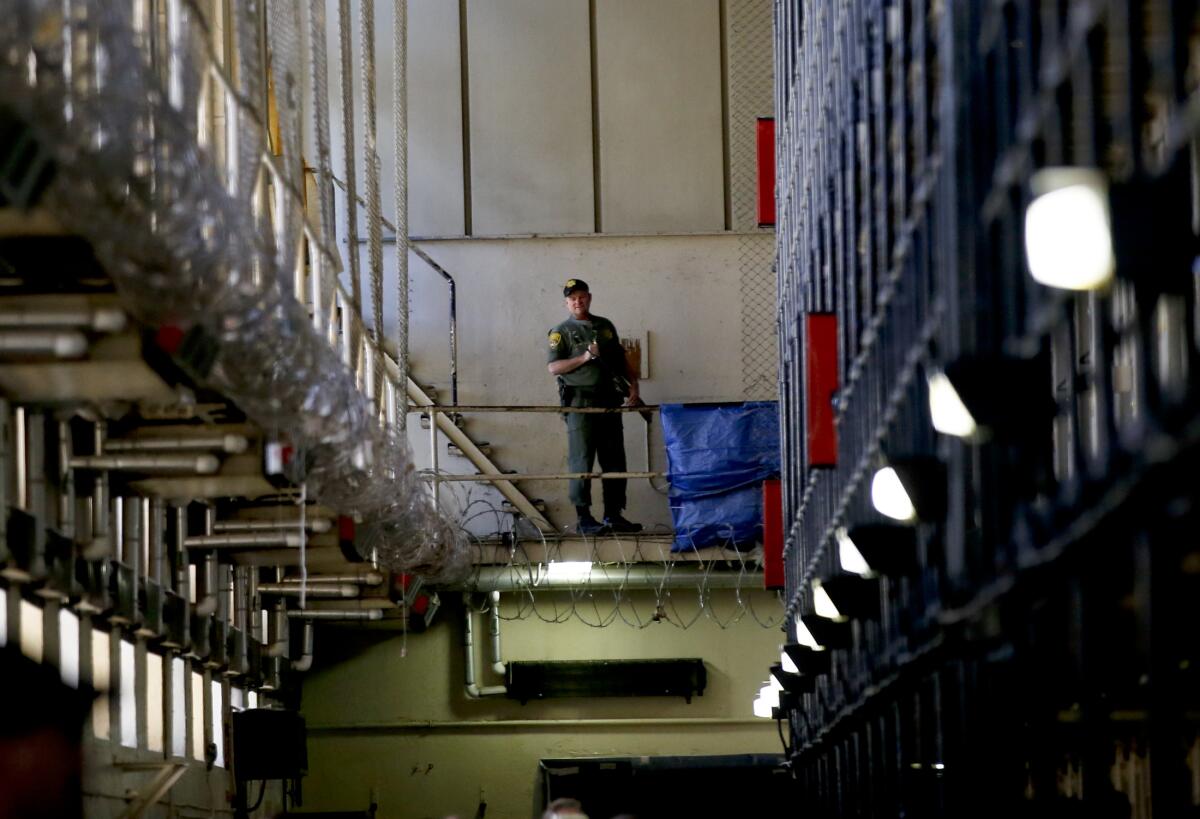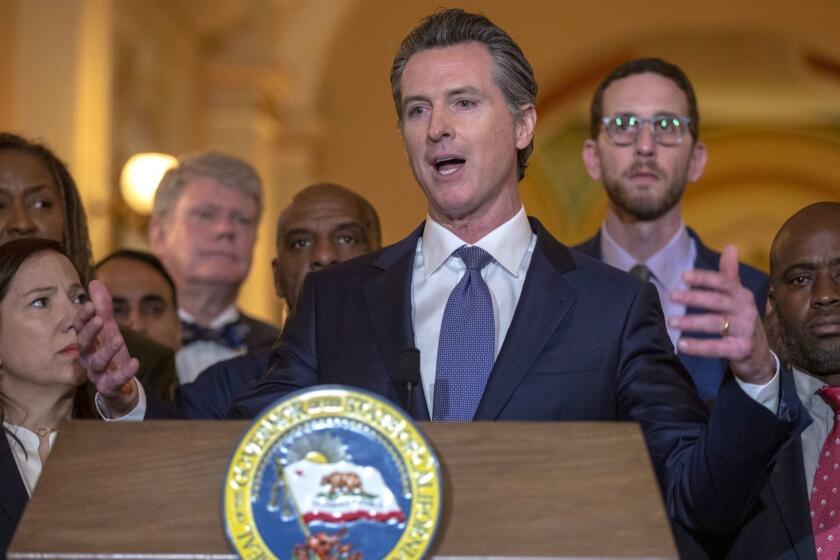Column: Newsom deserves credit and criticism for his effort to shut down death row

- Share via
SACRAMENTO — In reality, capital punishment hasn’t existed in California for years. And Gov. Gavin Newsom’s latest move will make it very difficult for any future governor to resume executions.
First, right after taking office three years ago, Newsom — breaking a campaign pledge — declared a moratorium on capital punishment and disassembled the execution chamber.
Now, he intends to move all condemned murderers off San Quentin’s death row and scatter them in other prisons around the state.
He also plans to dismantle death row and turn the space into a rehabilitation center. The goal is to “create a positive, healing environment” at San Quentin, according to an administration request for $1.5 million to pay a private consultant to “repurpose” the cellblock.
The “positive, healing environment” description sounds “a little too California,” says law professor Robert Weisberg, co-director of the Stanford Criminal Justice Center.
“That could arouse the ire of the right wing,” he continues. “The irony is that prison reformers might gag at that. Because they don’t think of such a thing as a ‘healing environment’ in prisons. We don’t think it’s healing and are not even sure it’s rehabilitative. We think it mitigates the harm of prisons.”
At any rate, it would probably take a future governor many years to reverse Newsom’s actions and revive executions.
“I think it’s possible there won’t be an execution in California for decades,” Weisberg says.
Newsom deserves both credit and criticism.
The Condemned Inmate Transfer Pilot Program has moved more than 100 people off of death row at San Quentin State Prison and the California Central Women’s Facility and into other housing locations, according to the California Department of Corrections and Rehabilitation.
The Democrat deserves credit for having the guts to follow his conscience and stand firmly against the death penalty.
Contrast that with former Gov. Jerry Brown and former state Atty. Gen. Kamala Harris — both avowed death penalty opponents — who were publicly neutral on ballot initiatives in 2012 and 2016 to abolish capital punishment. Both measures failed. Then-Lt. Gov. Newsom supported them.
“Premeditated murder is wrong in all its forms of manifestation, including government sponsored premeditated murder,” Newsom told reporters last week. “There’s other ways to hold people to account — life without the possibility of parole being foundationally one of them.”
Life without parole is clearly where he’s steering death row prisoners without any vote of the people or the Legislature.
Newsom deserves criticism for acting against the voters’ wishes. Not only did Californians reject two attempts to repeal capital punishment, they voted narrowly in 2016 to expedite executions.
That year, Newsom promised to carry out the death penalty law if he became governor.
“I would be accountable to the will of the voters,” he told the Modesto Bee editorial board.
“I would not [put] my personal opinions in the way of the public’s right to make a determination of where they want to take us as [it] relates to the death penalty.”
After he became governor and did a backflip, Newsom explained to reporters: “I’ve had to process this in a way that I didn’t frankly anticipate. A few months ago, it was an abstract question. ... [Now] the question is real … a question that goes deep to who I am.”
Politicians shouldn’t make campaign promises they can’t keep.
Regardless of one’s view of the death penalty — whether it’s immoral or justice — it isn’t working in California. It wastes money, time and energy.
“California has spent more than $4 billion in tax dollars on the death penalty since it was reinstated in 1977,” the legislatively created Committee on Revision of the Penal Code reported in November.
Since then, just 13 people have been executed in California — none since 2006.
Death penalty appeals take more than 30 years, the committee found, and “cost taxpayers $150 million a year.”
It concluded that “California’s system for capital punishment is beyond repair” and should be abolished.
There are 694 inmates awaiting execution. They include 124 who have volunteered to be dispersed into other lockups in a pilot program deemed successful by state prison officials.
Newsom plans to move all death row inmates to other prisons within two years. It’ll be mandatory, not voluntary.
This was permitted in the ballot proposition that called for expediting the death penalty. That didn’t work out. But the inmate transfer provision is allowing Newsom to empty death row.
The measure also required condemned prisoners to work in prison jobs and send 70% of the minuscule pay to their victims’ families. Death row wasn’t set up for work by inmates. So out they go.
“This is an administrative decision about the operation of prisons, not a policy decision on capital punishment,” says Greg Totten, chief executive of the California District Attorneys Assn. “The moratorium was a policy decision.”
But Weisberg sees it differently.
“It’s political symbolism,” the professor says. ”It gets into the voters’ mind the idea that we don’t need the death penalty anymore. It’s kind of a psychological move by Newsom.”
Actor Mike Farrell, president of Death Penalty Focus, an anti-capital punishment group, says Newsom’s action “moves us further in the direction of the abolition of the death penalty. It signals to the public that it’s no longer appropriate or necessary.”
Newsom showed some emotion in talking to reporters.
“The prospect of your ending up on death row has more to do with your wealth and race than it does your guilt or innocence,” he said.
“Forgive me for being elevated on this. I am. It gets my blood boiling. And I’m not going to be responsible for knowingly taking someone’s life …
“I look forward to advancing more leadership on reforming the death penalty here [and] hopefully across the country.”
Newsom should consider offering voters another repeal measure in 2024.
More to Read
Sign up for Essential California
The most important California stories and recommendations in your inbox every morning.
You may occasionally receive promotional content from the Los Angeles Times.













